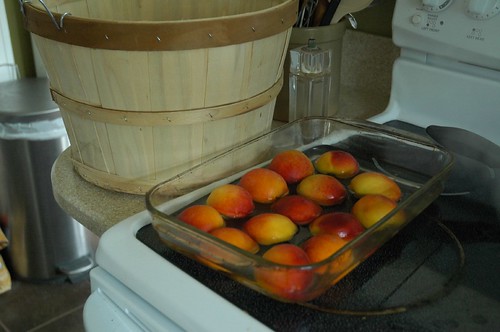Wednesday, June 18, 2008
Making Baby Food: As Easy as 1, 2, 3
I've heard many people tell me that they thought about making their own baby food or that they tried, but it was "too hard" or takes too much time. There's nothing hard about it and it really doesn't take much time, especially if you already cook food for yourself. Now, if you're a eat-dinner-out-every-night kind of person, then, okay, making your own food - for yourself or your baby - just isn't for you. But if you're like us and you make dinner on a regular basis, then all you have to do it set aside a little of the produce to make for your baby. The first thing we made for Claire was pureed carrots that Huz put aside after cooking some for dinner. It made a ton and lasted a long time. My style, since I don't come home and cook after working and not seeing Claire for 10 hours each day (I leave that to Huz, thankyouverymuch), is to do large batches of fruits and veggies at once - usually on the weekends. I did that today, in fact. "What!? you say, "on your work from home day!?" I know, I know. But it's summer and I'm slow, so I had to do something at home today. Why not make baby food!? It's productive, right?Like I said, making baby food is easy.
Step One:
Steam your fruit or veggie of choice.

Step Two:
Puree the soft fruit or veggie in a food processor, blender, or food mill.

Step Three:
Spoon pureed fruit or veggie into ice cube trays. Freeze and dump frozen food cubes into freezer bags. Be sure to label them because pears, apples, and bananas look awfully similar once frozen.

I also made peaches today but I baked them instead of steaming them because they are supposed to retain more flavor that way. Directions: heat oven to 400. While it preheats, wash and cut peaches in half laying them cut side down in a pan with an inch of water in it. Bake until soft and skins are wrinkled. Let cool, peel and pit, and puree in food processor.

See? Easy! Go forth and make some baby food! The benefits are that you control the ingredients (read: no pesticides, additives or preservatives), it's more economical, and you don't end up with a million glass jars to recycle or, God forbid, throw into the garbage. |

